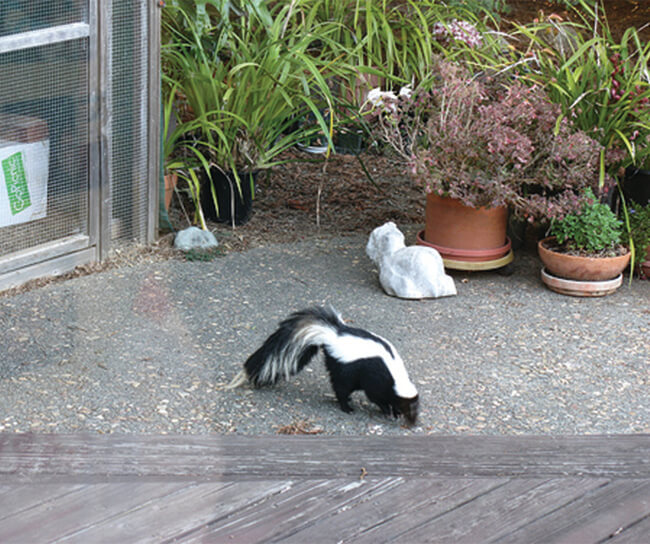People have some strange ideas about skunks. Many think that these animals are aggressive, lying in wait to spray the moment they get the opportunity. In reality, skunks are shy, docile creatures. They do not want to spray and only do so when there are no escape options available. If a family of skunks takes up residence on your property in the Kitchener-Waterloo area, it warrants prompt skunk removal for various reasons, but there is no reason to fear an attack.
How Do You Know When a Skunk Is About To Spray?
A skunk may spray without warning if you take it by surprise. This may occur if you come upon one in the dark. Whenever possible, though, a skunk prefers to give ample warning that it is about to spray. Look for behaviours such as the skunk turning its head, stamping its feet, shaking its tail, and then raising it in the air. If you see these signs, get away quickly but carefully. If the skunk no longer sees you as a threat, it will probably stand down and exit the scene rather than spraying.
Why Do Skunks Prefer Not To Spray?
An urban legend holds that skunks don’t spray because they do not like their own smell. It is true that skunks have a keen olfactory sense and that they do not like to be sprayed by other skunks, but that is not the only reason they avoid spraying. One theory is that, through the course of living with itself, a skunk gets used to its own smell. In any case, the spray is directed away from the skunk and rarely gets on its own skin or fur.
It is more likely that the skunks are simply trying to conserve their resources. Skunks have special glands on their rear ends where the musk is created, but this does not happen on a continuous basis. A skunk has a certain supply of spray at any one time. Once it has been depleted, the glands need time to make more. This process can take up to 10 days.
If you do get sprayed, it may be a small consolation to you that it will be at least a week before the skunk is able to do it again. Nevertheless, it is bad news for the skunk because its spray is one of its only natural defences. Having deployed it once, the skunk is vulnerable to predators until its supply is replenished.
How Can You Avoid Getting Sprayed?
If you see a skunk during the day, it should be easy to avoid getting sprayed because you can observe any warning signs it gives off. However, skunks are nocturnal, meaning they are more often active at night. That means that if you step out into your yard after dark, you may come upon a skunk unknowingly and unintentionally.
If you suspect there may be skunks in your yard, you may be able to avoid an encounter by alerting them to your presence. You can do this by making noise as you open the door and turning on the porch light. Fearing a confrontation, skunks will likely take the opportunity to make their escape.
Also, take these steps to avoid any confrontation between a skunk and your dog when letting the latter out of the house after dark. Dogs often misinterpret a skunk’s warning signs because they resemble the friendly gestures that canines use to invite one another to sniff and play.
What Can You Do About Skunks on Your Property?
As long as they are not actually living in your home, or under your shed or deck, it may be better to just leave skunks alone. They are omnivores that help clean up waste on your property and feed on harmful pests. A skunk in your home is a different matter, though. Our Skedaddle Humane Wildlife Control team in Kitchener-Waterloo provides skunk removal services for your protection and the animal’s well-being.




